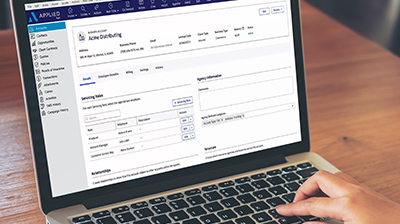Every day we hear from our customers that their business is becoming more complex, with nearly every agency diversifying into a range of new lines of business. For example, more and more agencies that traditionally focused on P&C are seeking additional growth by diversifying into Benefits and vice versa. On top of that, agencies frequently pursue any number of additional specialty lines of business and even offer some related financial services.
While this diversification is a sound growth strategy, it can create a very difficult IT landscape where agencies introduce multiple, separate software products to manage each of the business areas. Having multiple systems means agency staff now have different products to learn with varying user interfaces. It also introduces the challenging and costly task of building and maintaining a degree of integration between those systems. By managing separate systems, agencies struggle to manage data from many sources into a single, consolidated view of the business.
There is a better way – a single integrated agency management system.
A better digital foundation can be achieved through a modern, integrated agency management system, providing a single source of accurate data across all lines of business. An integrated agency management system provides many critical capabilities, serving as the central system for all prospect, customer, policy and financial data and providing efficient, standardized workflows with all data residing in one place. It allows for all of your staff to use the same system and workflows, leveraging data for quick, accurate insights. Integrated agency management systems automate selling and renewal tasks for producers, as well as servicing and accounting activities, all within a single application. Flexible software architecture is key to easily adding users, processes and workflows, enabling agencies to quickly respond to changes in the market or their customer base.
Your business requires an application that provides a comprehensive view of client information and internal operations to enable your agency to make more informed decisions about your business and capitalize quickly on new opportunities.
Benefits to consider when evaluating how to utilize a single, integrated agency management system as the foundation of your digital agency:
-
Single source of the truth
Integrated agency management systems leverage a single data source. By removing the need for additional software, agencies no longer have multiple customer records across multiple databases, thereby eliminating data integrity issues. Additionally, for multi-office agencies, a single application provides the same set of data across all offices and enables agencies to adequately balance work across offices, particularly in the event of a disaster. Agencies are left with a single source of truth about customers, prospects, carrier relationships and all internal operations to build their growth strategy. -
Service multiple lines of business in one application
An agency management system needs to grow and evolve with an agency’s business without relying on separate, disconnected software applications to manage specific components of the business. As the foundation of an agency, an integrated agency management system enables your business to manage multiple lines of business, like P&C, Specialty, and Benefits, in the same application. By supporting multiple lines in a single application, staff can follow consistent and common workflows for each segment of the business and quickly identify opportunities to cross- and up-sell clients to drive growth. -
Get everyone on the same page
As selling insurance continues to evolve into a team-based effort, marketing specialists, service representatives, account executives and others in the agency all need access to the data in one system to assist producers in marketing policies to the right carriers and obtaining quotes for a solid proposal package. To date, agents have used a myriad of methods of tracking prospects and new business opportunities outside of an agency management system which vastly limits the ability of principals and managers to understand how well – or not – sales are progressing. Separate data sources reduce management’s insight into the sales process and create redundant work for producers and service staff who have to manually rekey the same information into two disparate systems. By integrating sales automation, all of the critical steps that are part of a new sales process AND the renewal process remain within one single source of truth within the agency management system. -
Stay connected with your carriers
Importantly, end-to-end transactions between an agency and insurers need to happen within the management system as well for optimal agency productivity and efficient business operations. Download allows insurers to automate the delivery of information to an agency, driving greater agency productivity. For example, agencies that use various types of download have seen an average time savings of up to two hours per employee per day. Integrated agency management systems also enable staff to quote in real-time and quickly determine carrier appetite directly from the application. By tapping into the carrier interface provided in the application, agencies are able to deliver better advice, a wider range of products and localized personal service with greater productivity.
As your business considers how to expand and diversify into new lines of business, consider the value of a software solution that enables you to manage your entire operations – across all roles and multiple products – within a single application. An integrated management system will allow you to better service clients without the need to log into multiple software solutions to view customer records. In addition, native sales automation and market appetite search capabilities will allow you to have deeper insight into your sales performance and carrier appetite preferences. The future of the insurance agent will be shaped by tools and technology that allow your staff to work faster, smarter and together.
 By:
By: 

